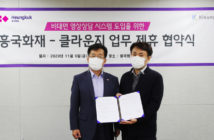“Helen” is a mobile app from startup Humanscape that provides patients who have had cosmetic surgery with all the information they need for recovery. This includes follow-up bookings and important information about recovery and taking medication.
According to research by Humanscape, there is a tendency for patients to not recommend hospitals if they didn’t receive any type of aftercare, even if the surgery turned out great. One of the main reasons Helen has been receiving interest is because most hospitals are lacking in this area, with little follow-up or aftercare for outpatients.
Humanscape was founded in 2014 by Min Hoo Chang while studying at university. On completion of his military service, Chang became interested in business after taking an entrepreneurship class. In his fourth year, he won a top prize at an entrepreneur competition hosted by his university and was awarded the chance to visit Silicon Valley.

“While taking the class, I didn’t actually think about starting a business, but after winning the award and meeting others who had founded startups themselves in Silicon Valley, I began to start dreaming about doing it myself,” explains Chang.
His first business project was a calendar service for pregnant women. Despite having many users, he had trouble finding a reliable business model for it and didn’t last long in the end. It was through this that he realized that even if a service had a lot of users, if there wasn’t a good revenue model then it’s hard to stay in business. He needed to find a market where consumers would willingly pay for something, and it was then that the market of cosmetic medical advertising caught his interest.
“We made a plastic surgery quote app called Mirror Mirror and jumped into the cosmetic surgery advertising market. It was an app where people could upload a photo of their face and get surgery quotes back from clinics. It gained huge popularity with the 10-30 age bracket — we even had offers of acquisition from hospitals.”
But his second business also ran into problems, this time related to the legality of the service. Nevertheless, he didn’t give up and worked on gaining experience while marketing for hospitals. Chang would make homepages for clinics and talk with staff and patients, assessing the needs and problems they were dealing with.
“I felt that not receiving aftercare following surgery was something that patients were very unhappy with. They are anxious, but the hospital just gives them a piece of paper with advice on it and tells you to come in for another check-up which is a frustrating thing.”
If patients have a problem, generally call centers can only handle bookings and can’t put you through to a doctor for advice. No matter how good the surgery, hospitals that don’t have a friendly attitude don’t get recommended as good places to go.
This motivated Chang to develop Helen, which has received a great response from users and hospitals using the service since its release. One of the reasons is hospital reputations becoming better and in some cases going viral. With hospitals usually spending large amounts on marketing to attract new patients, Helen has also helped change businesses’ opinions on how to reach customers. It means they can spend less on PR and focus more on retaining existing patients while caring for them post surgery.
Humanscape doesn’t just help patients, but also lets hospitals manage its customers better. After thinking about what hospitals need help with long term, Chang decided that a solution to effectively manage customer data was needed. He explains that the method of existing customer management solutions are old and ineffective. Many small and mid-sized hospitals are still using Microsoft Excel to handle patients and send out text messages.
Several well-known plastic surgery clinics in Gangnam are currently using Humanscape’s customer management solution. Coordinators working at these clinics are now able to manage their patients more easily by linking the app with their PC.
Humanscape recently gained additional funding from Magellan Technology Investment, following an earlier investment from Mashup Angels. The company plans to use venture capital to not only enhance its services, but also break into the South East Asian market.
“By improving the efficiency of hospital administration, we want to help doctors focus on their work, and make consultations more convenient for patients.”






